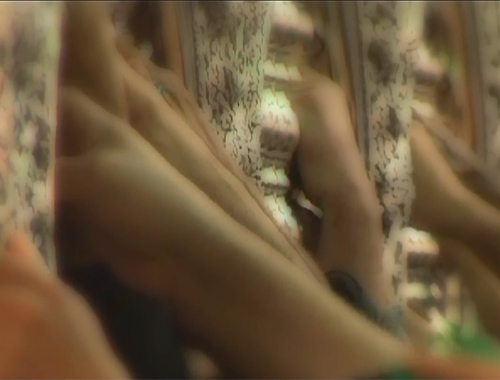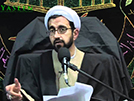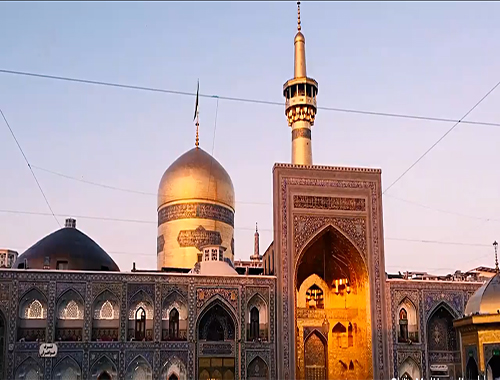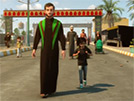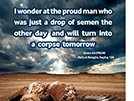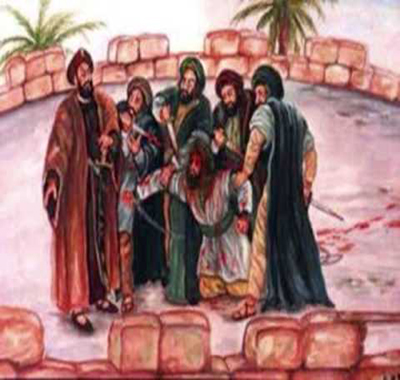
In Irshad and Kamil of Ibne Aseer it is narrated, that Umro bin Hurays sent his retainer to fetch water. The retainer returned with a jar of water along with a napkin and a cup, and gave the water to Muslim to drink. (Kamil) When Muslim took the cup to drink water, it became full with his blood thus he could not partake it. Thrice the cup was filled with water, and when water was filled for the third time, his front teeth fell in it. Muslim said, "Praise be to Allah! If this water would had been destined for me, I could have drank it."
Muslim was then taken to the presence of Ubayd-Allah bin Ziyad and he did not greet him. A guard told him, "Why do you not greet the commander"? Muslim replied, "Why should I greet him when he desires to kill me, and if he does not desire my death, then I have abundant greetings for him." Ubayd-Allah said, "By my life! You shall surely die." Muslim said, "So be it"? To which Ubayd-Allah answered in the affirmative. Then Muslim said, "If this is the case then give me respite so that I may will to someone among my kinsmen", to which Ubayd-Allah agreed. Muslim turned towards Umar bin Sa'ad and said, "There exists kinship between us, I desire that I may relate to you something in confidence." Umar refused to yield, to which Ubayd-Allah said, "Do not refuse to fulfil the desire of your cousin". Hearing this Umar stood up (Irshad) and sat with Muslim at a place where Ubayd-Allah could see them. (Kamil)
Muslim said, "I have become indebted in Kufa for a sum of seven hundred dirhams, so please pay it off by selling the property of mine which is in Medina." (Kamil) "And take my corpse after my death from Ubayd-Allah and bury it. Besides send someone to Imam Hussain (A.S) who would return him back." Umar went to Ubayd-Allah and revealed whatever Muslim had told him. Ubayd-Allah said, "A trustworthy man does not commit treachery, but sometimes a traitor fulfils a trust. As regards his (Muslim's) wealth, do whatever you desire to do with it. And as for Husain, if he does intend towards us, we will not intend towards him. But if he challenges us, we shall not refrain ourselves from (harming) him. Regarding his corpse, we shall certainly not accept your intervention in that matter." While others quote him saying that, "As regards his corpse, after we have killed him it is not our concern, you may do what you desire with it." Then he turned towards Muslim and said, "O son of Aqeel! The people were unified and in accordance with one another, but you came and divided them and created discord." Muslim replied, "It is not so, but the people of this town are of the opinion that your father (Ziyad) killed many of their virtuous men. He shed their blood and followed the footsteps of the Chosroes (the rulers of ancient Persia) and Caesars (the rulers of ancient Rome). We have come to enjoin justice and invite towards the Holy Book and Traditions (of the Prophet)." Ubayd-Allah said, "O transgressor! What relation you hold with these? And why did you not do that among the people, while you were busy drinking wine (Allah's refuge) in Medina"? Muslim replied, "Did I drink wine? By Allah! He knows that you are not speaking the truth, nor am I similar to what you have ascribed to me. While drinking wine is a practice of those (referring to Ubayd-Allah and his father Ziyad) who in rage and enmity spill the blood of the Muslims, and who rejoices and delights as if he has never ever committed any indecency (referred to Yazid)." Ubayd-Allah was infuriated and said, "May Allah kill me if I do not kill you in a manner as no one else has ever been killed in Islam." Muslim replied, "It is befitting you that you introduce such innovations in Islam which have never taken place. You are an evil murderer, wicked chastiser, ill natured, and a degraded person than all those who preceded you." Then Ubayd-Allah started abusing him, Imam Husain (A.S), Imam Ali (A.S) and Hazrat Aqeel (A.S) while Muslim did not speak to him.
Martyrdom of Muslim bin Aqeel bin Abi Talib (A.S)
Mas'oodi says that when their speech concluded and Muslim spoke harshly to Ubayd-Allah, he ordered that Muslim should be taken to the roof of the palace and it was said to Bukayr bin Humran Ahmari to behead him and take his revenge.
Jazari says that Muslim (A.S) told Mohammad bin Ash'as, "By Allah! I would never have surrendered if you had not given me the promise of protection. Then defend me with your sword for your promise has been broken." Then they took him on top of the palace when he was asking forgiveness from Allah and praising and glorifying Him. Then they took him to the place overlooking the shoe-makers and severed his blessed head which fell down. (May Allah's Mercy and Blessings be upon him). His murderer was Bukayr bin Humran, whom Muslim had previously wounded.
Then his body too was thrown down. When Bukayr came down, Ubayd-Allah asked him, "What was Muslim uttering when you took him to the roof"? He relied that, "Muslim was glorifying Allah and seeking His forgiveness. When I intended to kill him, I told him to come near and then I said: Praise be to Allah who has given me an upper hand over you and thus I have taken the revenge from you. Then I struck a blow, which went waste. Then Muslim said: O slave! Haven't you taken your revenge by inflicting this wound upon me"? Ubayd-Allah said, "Such dignity even at the verge of death"? Bukayr said, "Then I struck him a second blow and killed him."
Tabari says that Muslim was taken on the roof of the palace and his neck was severed and body thrown down to the people. An order was issued that his corpse be taken to that place where garbage is thrown and to be hanged there.
Derived from: Nafsul Mahmoom
By: Sheikh Abbas Qummi
 Kufa - Islam Guidance
Kufa - Islam Guidance

